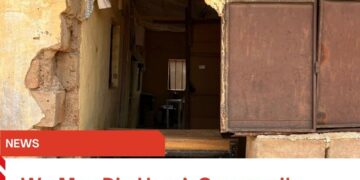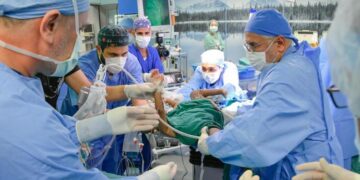By Abdulazeez Alhassan.
Qualitative education ranges from high academic standards, skilled and experienced teachers, updated curricula and textbooks, a conducive environment for learning, and strict discipline. This also refers to the ability of the school to provide the necessary facilities required to aid teaching and learning that can lead to the achievement of educational goals in line with prescribed acceptable global standards.
The education system in Nigeria is divided into three different sectors: basic, post-basic, and tertiary education. According to Nigeria’s latest National Policy on Education (2004), basic education covers nine years of formal education, which consists of six years of elementary and three years of junior secondary education. At the post-basic level, education includes three years of senior secondary education, while at the tertiary level, the system consists of a university sector and a non-university sector.
The first nine years of formal education in Nigeria are compulsory by law, yet one in five out-of-school children globally is in Nigeria, making up about 20% of the children that are not getting any kind of formal education globally.
In 2017, the World Economic Forum ranked Nigeria 12th out of 136 countries concerning the quality of basic education. Similarly, over 10 million Nigerian children in basic schools were not enrolled in 2019. As a result, the Sustainable Development Goal 4 (SDG4), which is an initiative of the UN, was ambitious because it seeks to ensure inclusive and equitable quality education for children across the world by the year 2030. And achieving this target is significant in Nigeria, where the state of education is daunting.
The need for quality assurance in Nigerian schools is highly desired to ensure the quality of teaching and learning. Therefore, there is a need to sustain quality education in Nigeria, but the question is, do we have quality education in Nigeria? I guess the answer is not in the affirmative, so, there will be a need to improve the quality of education and then sustain it.
According to Adegbesan (2010), the major needs of quality assurance in our education system in Nigeria, are: to serve as an indispensable component of quality control strategy in education, to ensure and maintain high standards of education at all levels, as well as to assist in monitoring and supervision of education, in addition to determining the quality of the teacher- input, followed by determining the number of classrooms needed to ensure quality control of education. Lastly, to determine the level of adequacy of the facilities available for quality control. This will ensure that the financial resources available can be prudently and judiciously utilized.
Olagboye (2014) lists some problems that face quality in the Nigerian education system as supervisors lack training in supervisory competencies, besides inadequate provision of infrastructural facilities, teaching aids, and instructional materials in schools, and poor remuneration of teachers. They are left in a state of neglect, coupled with their poor attitude towards work and lack of interest in teaching. In addition, the half-hazard approach and lack of uniformity in educational policy formulation and implementation in the country negate development, despite
Political instability and a lack of political will on the part of Nigerian leaders.
Quality assurance can be achieved in many ways, among which are: educational managers (government, proprietors, directors, NUT, among others) ought to function for quality assurance in our education systems, and therefore, their practices may be similar in all kinds of schools. These practices are planning, organizing, staffing, motivating, and evaluating.
Secondly, the educational sector is underfunded,
There is no doubt in any Nigerian mind that budgeting for the funding of schools in Nigeria needs serious inward-looking and attention. Nigeria’s budgetary allocations for education are still below the United Nation’s and World Bank recommended standards of 25% of total national budgetary allocations. In 2018, it was 7%, then 7.02% in 2019, 6.7% in 2020, and 5.68% in 2021.
Thirdly, there is a high level of corruption in Nigerian schools and the system itself. Stories of paid-for certificates, “special center” examinations, sexual indictment, extortion, and leaked questions are all corrupt practices bedeviling our country’s tertiary institutions. Some lecturers are known to withhold test scores or deliberately fail students for personal reasons. This should be drastically minimized at all levels of education.
Moreover, there is a need to improve teachers’ and lecturers’ training and upskilling. This will equip them for the job. As the Vanguard newspaper reported on November 12, 2017, during the “Teacher’s Day” celebration, it was revealed that there were no less than 300,000 unqualified teachers in Nigerian schools. The figure, which was released by the Teachers Registration Council of Nigeria, TRCN, was said to be 50% of teachers in the country.
In addition, insecurity is also a major challenge in achieving quality education. Most of Nigeria’s out-of-school children are in the northeast and northwest regions of the country, regions that have been heavily impacted by the Boko-Haram insurgency and banditry for almost a decade, so there is a need for the Nigerian government to provide adequate security to pave the way for conducive learning.
There is also a need to improve inspection and supervision of schools because it is quite sad that the level of inspection and supervision of schools has drastically reduced in recent times. In the days of missionary ownership of schools, inspection and supervision were among the best quality assurance mechanisms employed by the missionaries to enhance discipline, dedication, and adherence to the curriculum. This was not limited to basic and post-basic schools alone, but also tertiary institutions.
Conclusively, Nigeria cannot continue to remain in this situation of low quality in education standards. There is a serious need for improvement in the quality of education. And for this to take place, the above obstacles already mentioned should be addressed. There is a need to revive and re-enact the inspectorate division of various ministries of education if quality education is to be ensured.
Hence, the importance of qualitative education to national development cannot be over-emphasized. The issue that agitates the mind is the effect of poor implementation of educational policies on the development of Nigeria. Furthermore, in the present circumstances, the dream of Nigeria’s moving to a state of parity with the advanced world appears to be a mirage. If Nigeria continues to hide under the umbrella of the National Policy on Education, conscious of the implementation problems; our national aspirations will suffer greater impediments and our sustainable development will only rely on miracles, if any.
Abdulazeez Alhassan is a Journalist, Teacher, Author, and Poet, and can be reached via 08132888688, axeexx67@gmail.com.


































